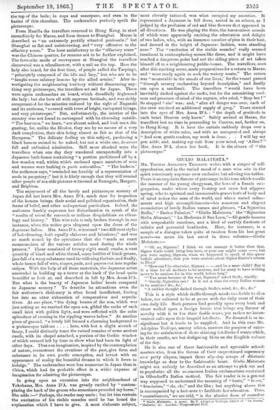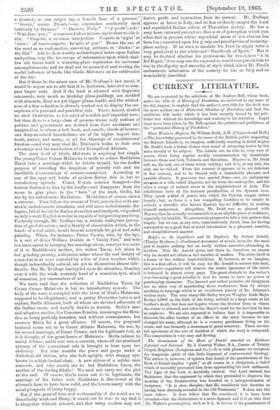GIULIO MALATESTA.*
Ma. THOMAS ADOLPHUS TROLLOPE writes with a simper of self- approbation, and in the varied mood of a man who sits in the spirit consciously supreme over exclusive but adoring tea-tables. There is an exquisite flavour of patronage in his tone which recalls the manner of the young clergyman, the hero of a female con- gregation, under whose every footstep not roses but slippers spring, who to spiritual and innumerable graces both of body and of mind unites the man of the world, and whom varied refine- ments and high accomplishments—his sonorous and elegant enunciation of lovely Italian names and phrases, "La Signorina Stella," "Enrico Palmieri," "Giulio Malatesta," the "Signorina Stella Altamari," "La Madonna di San Luca,"—fill gentle bosoms with unspeakable emotions, and a kind of earthly foretaste of infinite and perennial beatitudes. Here, for instance, is a sample of a dialogue taken quite at random from his last great novel—we mean his last novel in three volumes--Giulio Malatesta :— "' Oh no, Signora! I think we can manage it better than that. Signor Carlo could bring him here, or your son might come —; but you were saying, Signora, when we happened to speak of this queer buffalo adventure, that you were anxious about Signor Enrico's return to Pisa?'
"'How can I be otherwise, Signora —, and he a mere child ? But it is a time for all mothers to be anxious, and for many to have nothing more to be anxious for in this world, before long !'
"You mean because of the war, Signora ?' asked Stella, timidly. "'Surely, Signorina mia! Is it not a time for every Italian woman to be anxious ?
"A sudden thought dashed through Stella's mind, &c., cbc., itc."
This is a style which thrills through minds too feeble to dive below, too cultured to be at peace with the daily crust of their own daily life. Such persons feed greedily upon every husk and straw wafted upon a foreign breeze that brings any flavour of novelty with it to fan their feeble sense, yet makes no incon- venient calls upon their languid intellects. No demand is so in- significant but it tends to be supplied. And in this case Mr. Adolphus Trollope, among others, answers the purpose of cater- ing for the satisfaction of those sidelong iutellectivil wants which, in their results, are but disfiguring blots on the English culture of the day.
He is also one of those fashionable and agreeable school- masters who, from the throne of their unquestioned supremacy over petty cliques, impart those slip.slop scraps of dilettante knowledge so dear to the fashionable heart. Giulio Malatesta might not unfairly be described as an attempt to pick out and to popularize all the commonest Italian exclamations contained in 011endorff's Italian method. The fair reader is in a general way supposed to understand the meaning of "basta," "bravo," "bravissimo," "eke, cite," and the hike; but anything above this is accompanied by a foot-note to facilitate her education. Thus, " contadinaccio," we are told, " is the abusive form of contadino
• Giulio Malatesta. A novel. By T. Adolphus Trollops, author of " La Bests," "Marietta,' .te. London : Chapman and HAIL
a peasant ; as one might say, a brutish boor of a peasant." "‘ Grazie,' means Thnnks l—an expression continually used ironically by Italians." "‘Davvero; Truly." "'A quads' ccchi:'
'With four eyes;'" a common Italian phrase, equivalent to 1ete-2t- tete. " Corpetto, a co:nmon interjection. Cospetto is 'sight' or 'view;' 41 vostro cospetto, ' In spite of you!' Hence the use of
the word as an exclamation, answering, perhaps, to Zooks ! ' or the like." Add to these sundry archeological notes upon Italian antiquities, very like the scraps of information upon which shal- low old beaux build a watering-place reputation for universal accomplishments, and we shall not be accused of underrating the useful influence of books like Giulio Mal4e3ta on the cultivation of the day.
But if these be the minor uses of Mr. Trollope's last novel, it would be unjust not to add that it is, doubtless, intended to com- pass larger ends. And if the book is adorned with linguistic ornaments, very much as birthday plum-puddings are studded with almonds, there are yet bigger plums inside, and the wicked- ness of a fine seduction is cleverly worked out to display the cor- ruptions of a paternal and pontifical rule. These, indeed, needed no such illustration in the mind of sensible and impartial men ; but then there is a large class of persons whose only notions of politics and government are derived from their sentiment and imagination, to whom a bell, book, and candle, clouds of incense, and deep-mouthed benedictions, are of far higher import than truth, justice, and mercy, or all the blessings of constitutional freedom—and they may read Mr. Trollope's books to their own advantage and the satisfaction of the Evangelical Alliance.
The story itself of Giulio ilfalgtesta is anything but simple. The young Count Cesare Malatesta is made to seduce Maddalena Tacca into a marriage which be thinks invalid, for the double purpose of revealing the iniquities of priestly rule and the inevitable shortcomings of counter-conspiracy. According to One of the approved tricks of modern fiction this is but an introductory episode. Count Cesare marries Sampieri—the heiress destined to him by his family—and disappears from the scene to give place to the " hero " of the work, Giulio, his son by the unfortunate Maddalena. Maddalena of course, enters a convent. Then follow the events of 188, interlarded with car- nivals, melodramatic situations, and still more melodramatic dia- logues, full of would-be Italian screeches and rantipolo, vulgarized as only a weak English novelist is capable of vulgarizing anything. Curiously enough, Mr. Trollop has a certain embryonic percep- tion of good situation>, and a faculty of observation which, in the hands of a real artist, would furnish materials for good and solid painting. When, for instance, Pietro Varain, who, by the bye, is a sort of dilute William Dobbin in 'Vanity Fair," and who is a main agent in bringing the marriage about, conveys the news of it to Maddalena's mother, the widow Tama, left alone in her winding poverty, a situation arises where the real insight of a novelist is at once revealed by a few of those touches which, though indescribably natural, are yet in themselves almost inde- finable. But Mr. Trollope having led up to the situation, blunders over it with the weak, unsteady hand of a sensation tyro, afraid of sensation, yet unconscious of art.
We have said that the seduction of Maddalena Tacca by Count Cesare Malatesta is but an introductory episode. The body of the work is occupied with the loves of Giulio Malatesta, supposed to be illegitimate, and a pretty Florentine heiress and orphan, Stella Altammi, both of whom are devoted adherents of the Italian cause, and equally hostile to Austria. Stella's aunt and adoptive mother, the Countess Zenobia, encourages the flirta- tion as being perfectly harmless, and without consequence, but reserves Stella for a great alliance. Of course, the proposed husband turns out to be Count Alfonso 'Malatesta, the son, by his second marriage, of Count Cesare, and the legitimate heir, as it is thought, of the great house of Malatesta. Stella refuses to marry Alfonso, and is sent into a convent, where all the practised tyranny of the conventual rule is brought to bear upon her obduracy. For nine months she pines and gasps under a diabolical old abbess, who sits bolt upright, with shaggy eye- brows, in a high-backed chair. A new abbess of a milder turn succeeds, and who should she be but Maddalena Tacca, the mother of the darling Giulio! We need not carry out the plot to the end. Of course, Giulio turns out to be legitimate, the marriage of his father with Maddalena is discovered at the eleventh hour to have been valid, and the lovers marry with the usual prospects of being happy.
But if the general tone and workmanship of the novel are in- describably weak and flimsy, it would not be true to say that it is altogether without interest, and that many readers may not
derive profit and instruction from its perusal. Mr. Trollope appears at home in Italy, and he has evidently caught the local and superficial Italian colour of Florentine society. He has a very keen outward perception, that sort of perception which you often find in persons whose superficial sense of olakn'ation has been long exercised upon the gcssip and peculiarities of watering- place society. If he were to emulate Mr. Ford he might write a very good rival to the celebrated" Handbook of Spain." But it may be doubted whether his pretensions for desciiption "ii la Bel Esprit," if we may use the expression, would ever permit him to rise to the dignity and sincerity of style which adorn Mr. Ford's enthusiastic admiration of the country be has so fully and so wonderfully described.































 Previous page
Previous page